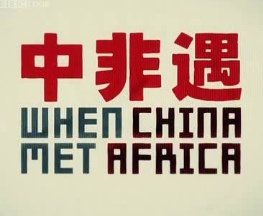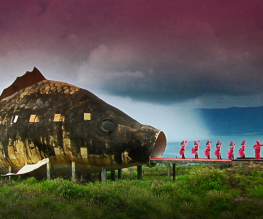When China Met Africa

Even the title of When China Met Africa conveys how deeply ambitious this documentary is. Trying to capture the merging of two entirely different cultures, the economic principles and technicalities of which are mostly alien to the average moviegoer, is no easy feat. This is perhaps why while the 2010 documentary may be hugely important, it’s still bloody hard to watch.
Throughout the documentary, we are introduced to what feels like hundreds of levels of Chino-African society, from ambitious board room conferences, to investment fairs in central Zambia to inevitably, the small struggling local farmers. Obviously, the utter vastness of the issue at hand – economic patronage of China toward Africa – makes it difficult to relate on an intimate level with the film. However, the film’s more compelling aspects occur while it focuses on the daily struggles of Chinese business owners struggling with the realities of entrepreneurship in Zambia.
The film is at its most striking in its opening minutes, where we are given a fly on the wall view of the 2006 China-Africa summit. On-screen titles re-inform us that despite decades of Western aid, Africa remains the world’s poorest continent. Africa is now accepting billions of dollars in investments from the Chinese government, around which are tip-toeing buzz-words and vague promises. China is pitted as a “close friend, reliable partner and good brother to Africa”. Everybody cheers. Hurray brotherhood and partnership!
We are immediately taken to three years later, where we open on Chinese farmer Liu Chanming living in almost total squalor in Zambia. He calls out the window to a troupe of African women who have turned up for work. He writes down a few names, wrinkling his brow when his unable to pronounce them, and dismisses them again. He later tells the camera that in China, he was an office worker who could barely cover his family’s expenses. “I was an employee in China. I am an employer in Zambia. It is a huge difference.”
We suddenly realise that the majority of the small-time Chinese entrepreneurs in Zambia are adventurers rather than business owners, who are learning by doing rather than feeding off previous experience. This leads to rather varied outcomes throughout the movie. We see farm owners joking with their African employees, often working alongside them in brochure-like harmony. Adversely, we are introduced to financiers halting progress halfway through projects, employers failing to play their Zambian employees, and one instance where one of Chanming’s workers are dismissed for having diarrhoea. The realisations of dreams are equally bittersweet throughout the country, with the film focusing heavily on passive-aggressive boardroom meetings and cultural clashes in aplomb.
The film gradually loses its grip when it dithers on making any real point about its subject matter. There is little narrative interference with the picture, and as a result the audience is left confused on how to feel. While When China Met Africa strives to make a human point about a global issue, the most it delivers is a simplified version of a much vaster animal.






Recent Comments